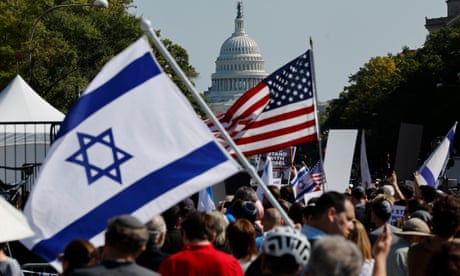Feedback loop: the tangled ties between the US election and the Middle East war
Benjamin Netanyahu has humiliated Biden’s America and seems to anticipate Trump’s return, but what would that mean for Israel?
T
Foreign policy rarely matters much in US presidential elections, but this year could be an exception. In a contest likely to be decided by small margins in a handful of states, the fallout from the conflicts in Gaza, the West Bank and Lebanon, with a potential war with Iran looming, could have a significant impact on Kamala Harris’s prospects.
On the other side of the coin, the outcome of the election on 5 November will affect the Middle East in unpredictable but potentially momentous ways. Despite the clear limits on Washington’s ability to control Israel, its closest partner, the US remains by far the most influential external power in the region.
Joe Biden’s steadfast support for Israel in the face of mass civilian casualties in Gaza, and Benjamin Netanyahu’s clear defiance of US-led efforts to establish ceasefires in Gaza and Lebanon, have alienated many progressive Democrats.
Kamala Harris has not distanced herself in any significant way from Biden’s Middle East policy and now faces a particularly tough fight in Michigan, home to a sizable Arab American community. Losing that state would considerably complicate Harris’s path to the presidency.
The spread of war and the outbreak of open conflict between Israel and Iran is likely to affect the presidential campaign far beyond Michigan, combining doubts over the Biden-Harris team’s foreign policy competence with the threat of an oil price rise at the worst possible time for Harris. It could be this election’s fatal “October surprise”.
“You’re seeing Americans being evacuated from Beirut now and it really helps the overall Trump narrative of ‘the world’s a messier place with these weaklings’,” said Daniel Levy, the head of the US/Middle East Project policy institute.
Just as the Middle East can sway US politics more than any other foreign part of the world, US politics exerts a clear and constant influence on the Middle East. Demonstrative support for Israel has become a shibboleth for both Republican and Democratic presidential candidates, almost irrespective of Israel’s actions.
Dana Allin, a senior fellow at the International Institute for Strategic Studies, pointed out that Israel’s untouchability in the US political arena had developed over time.
“This was not the way presidents spoke in the Richard Nixon era. There is irony in this fealty insofar as the respective goals and worldviews of the two allies have never been further apart,” Allin argued.
Netanyahu has vigorously enforced the American taboo against using its leverage over Israel. He has done so by mobilising the power of pro-Israel sentiment in the US against any president who has tried to rein him in.
When Barack Obama announced there should be a stop to the building of settlements in the West Bank, Netanyahu called his bluff and ignored him. When Biden put a hold on the delivery of US-made 2,000lb bombs which were being used to flatten residential areas in Gaza, the Israeli prime minister declared it “unconscionable”, and later accepted a Republican invitation to address Congress and met Trump.
In Biden, he was assailing a US president with more of a personal attachment to the Israeli cause than any of his predecessors, who had flown to Israel days after the 7 October attack and literally hugged Netanyahu on the airport tarmac. The Israeli prime minister still turned on Biden at the first sign of doubt.
Netanyahu’s message has been clear: any hesitation in the provision of weapons or diplomatic support will incur a heavy political cost. The US leader held responsible will be portrayed as a traitor to Israel.
The result of this tactic has been a deep reluctance on the part of successive presidents to use US leverage, as Israel’s biggest arms supplier by far, to curb the excesses of the Netanyahu coalition in any meaningful way, in Gaza, the West Bank or Lebanon.
Without that leverage, a succession of US ceasefire initiatives this year have come to nothing, shrugged off by Netanyahu in ways that were sometimes deeply humiliating to the US as a superpower and supposedly dominant partner in the relationship.
“Netanyahu has spent a long part of his career turning America into a partisan issue, trying to convince Israelis that the fortunes of Israel are bound up with Republican leaders,” Dahlia Scheindlin, a Tel Aviv-based political analyst, said.
It is unclear whether a Harris administration would steer a significantly different course to Biden’s. On one hand, Harris does not have the same personal history with Israel as Biden and, if she wins in November, would be freer to experiment with a change in policy.
On the other hand, winning the election in the face of widespread Democratic discontent over the Middle East could convince Harris that the progressive threat over the issue could be discounted.
“One scenario is that Kamala Harris wins and continues Joe Biden’s policies, which is kind of: we want to do the right thing, but we’re basically going to let Israel do what it wants,” Scheindlin said. “Or she could get a little tougher, in line with a more progressive wing of the Democratic party, and say: ‘We’re going to start applying American law on the export of our weapons,’ which I doubt, honestly.”
It seems almost certain that Netanyahu’s decision-making is influenced by anticipation of a Trump restoration in the White House, and he is not alone. The Saudi monarchy may also be waiting for Trump’s return before signing a diplomatic normalisation agreement with Israel, though the current hostilities make such a deal unlikely in the near term.
With Trump back in the White House, Netanyahu would not have to deal with US resistance to greater Israeli control, even annexation, of the West Bank. In 2019, the Trump administration recognised Israeli sovereignty over the annexed Golan Heights. Trump’s former ambassador to Israel David Friedman has been auditioning for a role in a second term with a new book, One Jewish State, arguing that Israel should swallow the West Bank whole.
“With Trump in the White House, annexation becomes a much more active possibility,” Khaled Elgindy, a senior fellow at the Middle East Institute, said. “It is an administration that is going to be even less concerned with Palestinian lives than the current one. They’re not even going to pay lip service to humanitarian assistance.”
There is less certainty over whether a newly elected president Trump would help Netanyahu achieve his longstanding strategic goal: recruiting the US for a decisive attack on Iran’s nuclear programme.
Middle East policy in Trump’s first term was built around hostility to Iran. In his last weeks in office, Trump gave the green light to the assassination of the Revolutionary Guards commander Qassem Suleimani. On the other hand, Trump called off a missile strike on Iran in June 2019 because he thought the likely civilian casualties were disproportionate for a response to the shooting down of a US drone. And one of the points of consistency in Trump foreign policy is his aversion to US involvement in foreign wars.
Netanyahu may be hoping for a Trump win in November, but the consequent support from Washington is likely to be more transactional and less sentimental than Biden’s. Ram Ben-Barak, a former Israeli intelligence chief, worries that in the long term, a Trump-Netanyahu combination could end up poisoning the fundamental relationship between their two countries.
“What makes our relationship with America is sharing the same values,” Ben-Barak said. “The moment you have an Israeli prime minister with no values, as we have today, and a US president without values like Trump, I’m not sure this bond will continue.”




